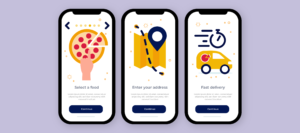Why AI in Mobile App Development? Guide to Implementing AI in Mobile Apps[2023]
Have you ever considered how life is changing due to smartphone apps? Whether you like it or not, mobile apps significantly impact how we live our lives. Because of this necessity, mobile app owners and developers have been under pressure to keep ahead of the competition.
The artificial intelligence (AI) market is predicted to increase rapidly over the next ten years, per Next Move Strategy Consulting. By 2030, it is anticipated that its current worth of just under $100 billion US will have increased twentyfold to just under $2 trillion US.
But that’s only the very beginning of AI in Mobile App Development.
Such statistics clearly show that people are becoming more acclimated to the convenience of mobile apps in all aspects of their lives.
In the world we live in today, machines have incredible capacities for learning, reasoning, and decision-making, much like the human mind. Artificial intelligence is a unique field of technology that is not just the stuff of science fiction or the dreams of the distant future. It has developed into a breathtaking reality, altering the face of numerous sectors.
In terms of mobile development, AI may instantly turn your customer’s device into a personal shopper, linguist, or talented photographer.
The use of AI in the creation of mobile applications continues.
Continue reading to learn how AI affects mobile apps and the benefits of utilizing AI in Mobile App Development for business.
Why AI in Mobile App Development?
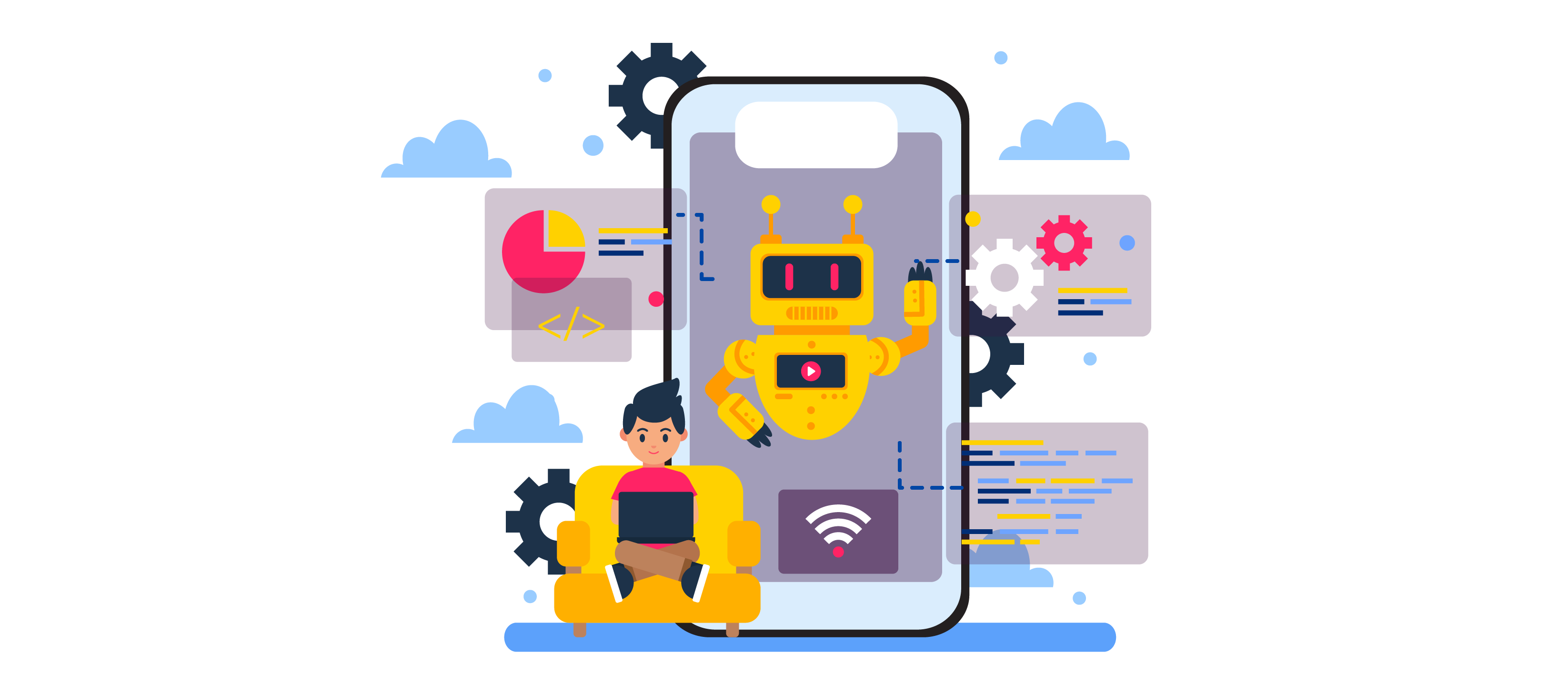
The development of mobile apps was just getting started not too long ago. It was nonetheless a milestone in the technological transformation that will influence how we use mobile devices. Earlier versions of mobile apps, such as calculators, calendars, and messaging tools, offered consumers only the most fundamental features. Also labor-intensive was the development process, which called for thorough coding and manual testing to ensure compatibility with various mobile devices.
As technology developed, AI application development began to influence. This entry opened up revolutionary possibilities for mobile app developers and owners of businesses.
AI in Mobile App Development has become a game-changer. The way apps are made has been revolutionized by this practical technology. Additionally, it helps improve user experiences and expand the realm of possibilities.
This is insufficient. Below, we will delve into the advantages of AI in mobile app development and the tremendous improvements it has brought.
Benefits of AI in Mobile App Development
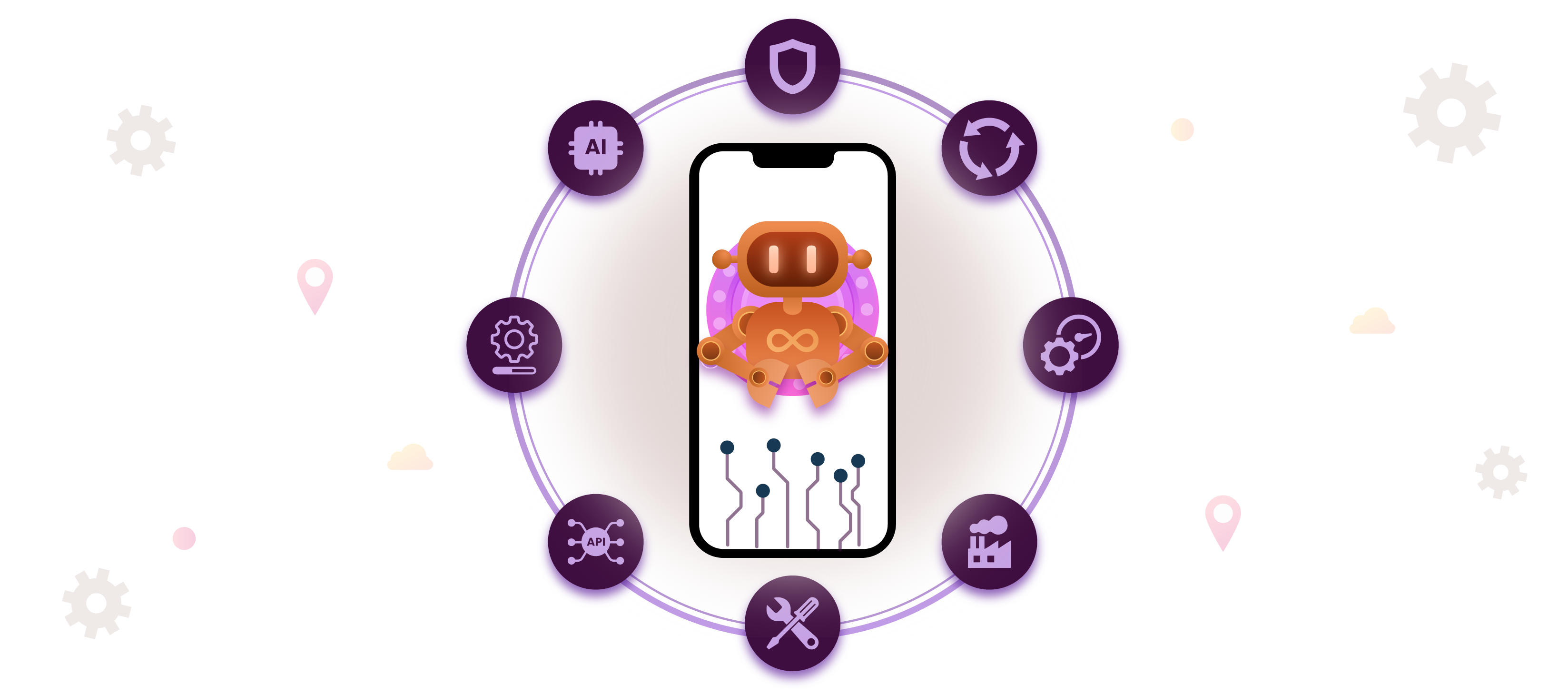
1. Powerful App Authentication –
Mobile apps without strong protection have become easy targets for cybercrime with the growth of online hackers. Algorithms for security enabled by AI can stop this annoyance. Mobile apps must, therefore, keep up with technological advancements to anticipate security issues and thwart them in real-time. Integrating AI in Mobile App Development will enable the app to monitor abnormalities and outliers in user activity.
2. Conversational UI –
Mobile apps’ usability and performance can be greatly improved by conversational user interfaces (UIs) developed utilizing machine learning (ML) and natural language processing (NLP) technologies. You may have noticed a lot of chatbots supporting higher customer satisfaction open in front of you. This allows clients to express their needs and questions with their clients. It makes it easier for users to interact with the app naturally and logically, utilizing voice and text-based commands.
3. Improved Security with Facial Recognition –
Since Apple introduced AI-based Face Unlock in September 2017, a lot of time has passed. The users enthusiastically embraced the innovation, and nothing appeared to stop it. This concept seeks to increase security by using facial information. Each user has individual, non-copyable facial data. Nowadays, facial recognition software in apps is so sophisticated that it can even identify a face with alterations like piercings and hair in a different color or style.
4. Boost Revenue –
When consumers are more satisfied with a particular app, they are more likely to use it to make a purchase, stay loyal, use it again, and tell their friends about it. AI in Mobile App Development has cutting-edge functionality and improved performance, substantially improving the user experience. As a result, the revenue from apps will undoubtedly increase significantly with AI.
5. Improves Reasoning –
Science makes it possible for mobile apps to utilize deductive reasoning and logical thinking to resolve problems, such as proving theorems and fixing puzzles. A mobile app developer can quickly make an educated guess regarding the best option to select based on the wants of their clientele, due to artificial intelligence.
AI in Mobile App Development is used by businesses that provide services like Ola and Uber to assist them in quickly contacting their customers. Using AI, routes and roads may be investigated. Finding shortcuts to get to their clientele even helps.
6. Enhances Search –
To enhance the functionality of mobile apps, developers are leveraging AI and ML technologies to create speech and picture recognition. This artificial intelligence-based technology, dubbed Google Lens, has already been used. The user experience and usability of the search will be increased. You can raise your conversion rates with its assistance. Website voice search optimization is becoming essential. It will soon be crucial to user experience and search engine ranking.
7. Improve Daily Operations –
Mobile apps benefit greatly from artificial intelligence technology in creating sophisticated features that eliminate the routine risks and tasks of apps. Additionally, this helps engineers learn more effectively, which is terrific for users.
How Artificial Intelligence Can Affect The Mobile Application Development Process
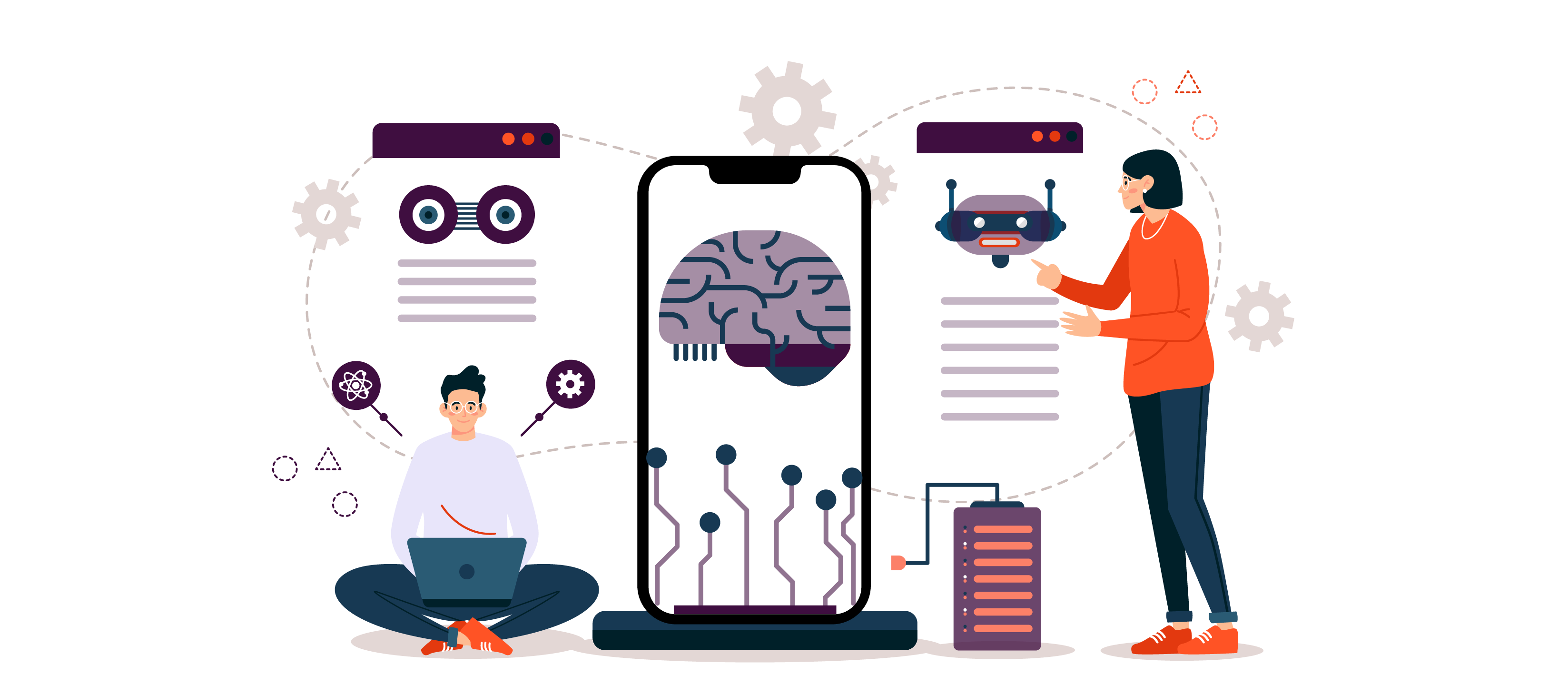
Without question, AI in Mobile App Development has transformed the entire development process for mobile apps and ushered in a new era of transformation. Here’s a closer look at how AI has changed the way that software is developed:
1. Streamlining Tasks –
Automating repetitive processes is possible using AI-powered tools and frameworks. Reduces the amount of manual labor needed. For instance, AI-powered code-generating tools can produce code snippets automatically.
2. Learning –
Artificial intelligence technologies for learning can facilitate the learning process and remedy errors. Any time a tool applies various methods to a problem, the program takes the one that yields the best results and recommends it for usage in the future.
3. Improved Collaboration –
Collaboration is improved because AI-based solutions allow development teams to communicate and work together more efficiently. Real-time code reviews, automated documentation creation, and intelligent task management are just a few of the capabilities these solutions offer, which boost productivity and make it possible for teams to operate more effectively.
4. Problem-solving –
This AI in Mobile App Development uses a variety of software programs and machine learning to analyze the causes of interactions.
The Best Artificial Intelligence Technologies For Mobile Apps
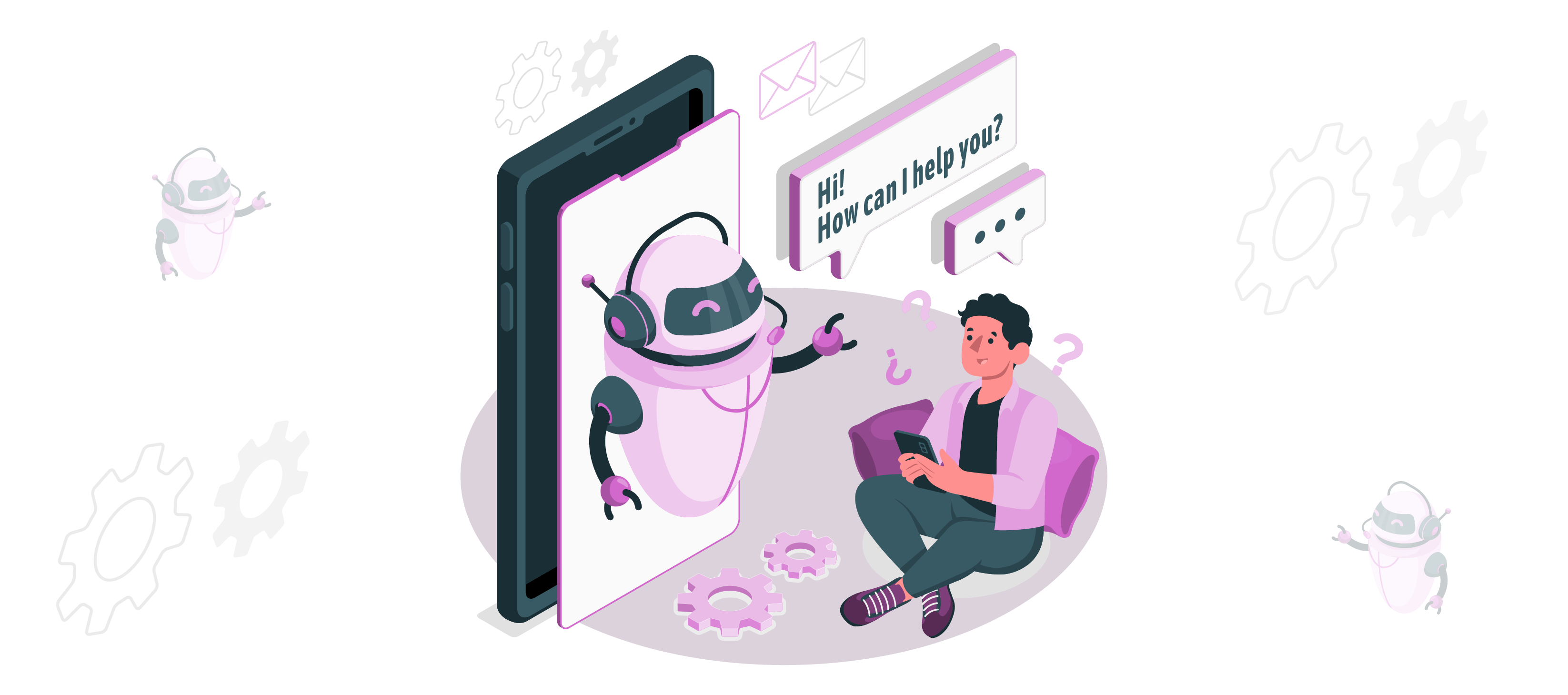
1. AI Chatbots –
This artificial intelligence function is quite beneficial for creating mobile applications. It helps businesses engage with those who frequently submit feedback forms and ask questions about the company and its development procedures.
2. Voice Assistants –
Mobile apps may now incorporate voice assistants like Siri, Google Assistant, and Alexa due to natural language processing (NLP). Whatever they say, NLP allows your app to understand the meaning and context of what they say.
3. Image and Video Recognition Tasks –
This is a fantastic feature for creating mobile apps with AI and relies on the ability to find any object in a digital or video image. Mobile apps across various sectors, including e-commerce, social networking, entertainment, gaming, and more, heavily depend on artificial intelligence. For instance: Object detection, facial recognition, and augmented reality (AR) experiences
4. Machine Learning –
One of the most established and fundamental Artificial Intelligence technologies, it integrates with most applications. The use of machine learning technology in classification and forecasting is quite advantageous. Therefore, having an AI business application assists in running a business that entails predicting.
5. Personalized & Emotion Recommendations –
Artificial intelligence is essential for understanding facial expressions of human emotions. Emotion recognition technology uses cutting-edge picture processing to capture human emotions via voice intonation and speech signals. Using machine learning techniques such as Data Collection, User Profiling, Pattern Recognition, and Recommendation Generation, AI algorithms may analyze user data to deliver personalized suggestions in mobile apps.
Conclusion
This guide has provided you with an understanding of AI technology for app development. You can now use AI and its advantages to develop your next app project. Additionally, the significance of AI’s involvement in mobile app development trends is expanding, and it will soon overtake human creativity as its core component. So, it makes sense to invest in AI.
You may incorporate AI in Mobile App Development and give your app intelligence with the help of skilled developers from a reputable technology partner like Pairroxz Technologies. Engaging your clients and encouraging them to use your services also helps.
FAQs
Question 1: How might AI affect the creation of mobile apps and user experience?
AI has the following effects on user experience and mobile app development.
- Using AI, you may create self-learning mobile applications
- Use logical reasoning to automate processes
- AI has an impact on design
Question 2: How Can Artificial Intelligence Be Implemented in Mobile Apps?
- First, determine the AI technology you want to use in your mobile app after studying.
- Think of utilizing a free machine learning library like TensorFlow or Keras.
- Select a machine learning algorithm that is appropriate for your application.
- Create a data set, if necessary, to train your AI system.
- For your AI algorithm, create an API, then include it in your program.
- To make sure your AI system satisfies your needs, test it.
Question 3: What Are the Difficulties of Using Artificial Intelligence in Mobile Apps?
- Strict Device Limitations
- Limited Access to Data
- Long Development Period
- Cost Maintenance

![Why AI in Mobile App Development? Guide to Implementing AI in Mobile Apps[2023]](https://pairroxz.com/blog/wp-content/uploads/2023/09/Why-AI-in-Mobile-App-Development-Guide-to-Implementing-AI-in-Mobile-Apps2023-feature-image-1.png)


